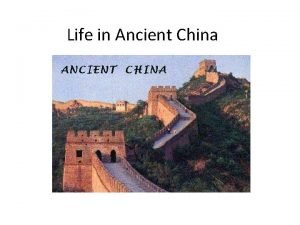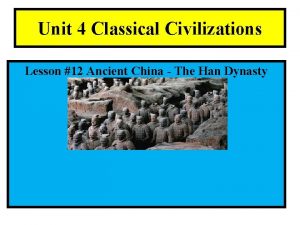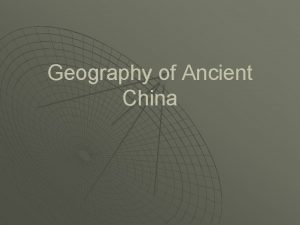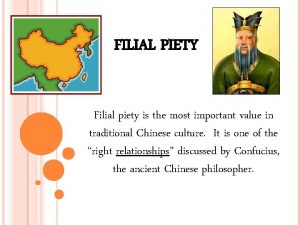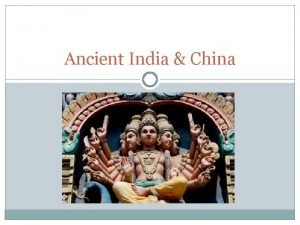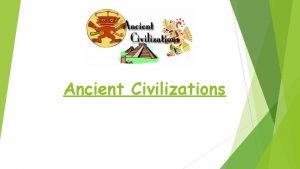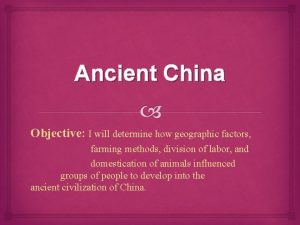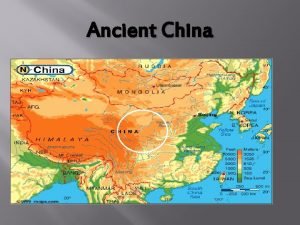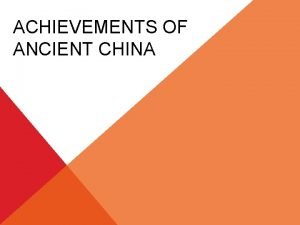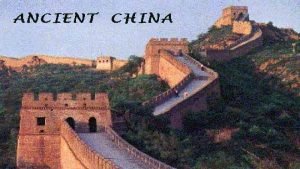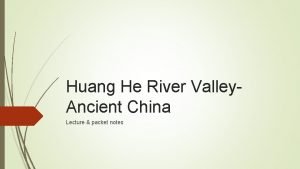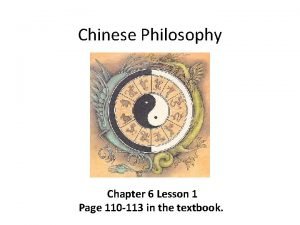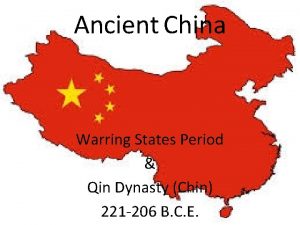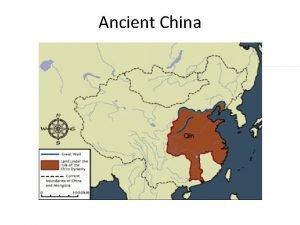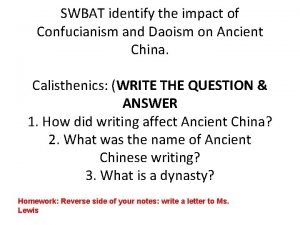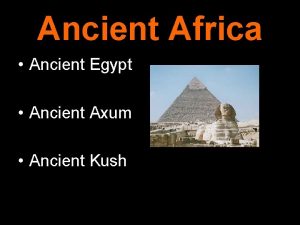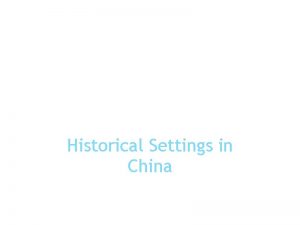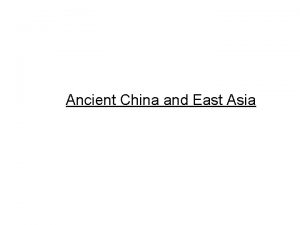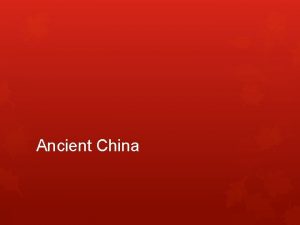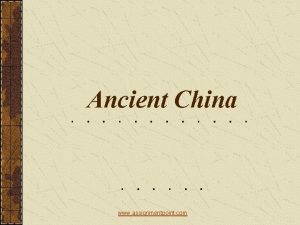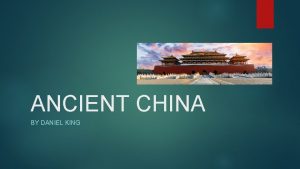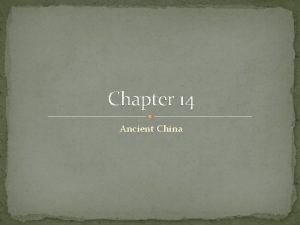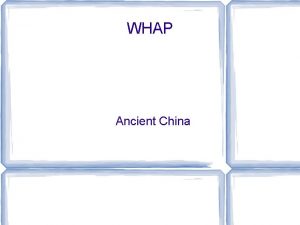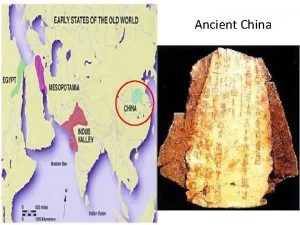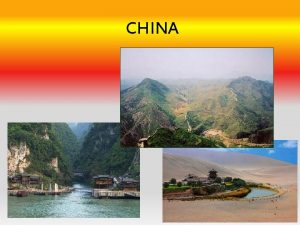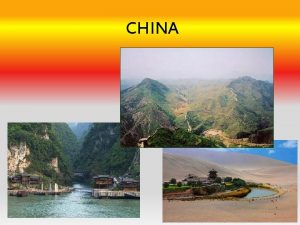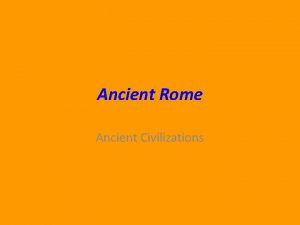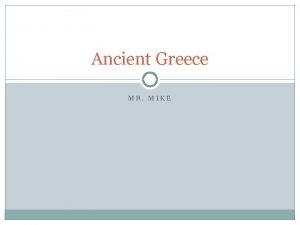Life in Ancient China Life in Ancient China


















- Slides: 18

Life in Ancient China

Life in Ancient China. Aristocrats • Families owned large estates • Estates didn’t remain large for very long, they were divided among the male children • Houses were large and decorated with silk wall hangings and fine furniture • Houses were surrounded by walls to keep out bandits and for protection during wars • Relied on farmers to grow their crops that made them rich

Life in Ancient China- Farmers • 9 out of 10 Chinese were farmers • Lived in simple homes inside village walls • Grains grown in northern China and rice in southern China • Paid for use of aristocrats land by giving them a large part of their harvest • Most had a small piece of land to feed their families

Life in China- Farmers • Paid taxes and worked one month a year building roads or working on large government projects • In wartime the farmers also served as soldiers

Life in China- Merchants • Shopkeepers, traders , artisans and bankers were in this class • Became quite rich, but were looked down upon by aristocrats and farmers( not a honorable profession) • Couldn’t hold government jobs, government officials couldn’t be concerned with money


Chinese Family • Basic building block of society and was considered very important • All members worked in the fields to produce more for the family • Older sons raised their own crops and provided for their parents • Families cared for the aged, the young and the sick

Chinese family • Practiced filial piety – Had to respect their parents and all older relatives – Family members placed the needs and desires of the head of the household above their own needs – Head of the household was the oldest male usually the father

Role of men and women • Men – Respected because they grew the crops – Went to school – Fought in wars – Ran the government • Women – Raised the children and ran the household – Worked in the fields

Chinese Thinkers • Zhou dynasty was weakened around 500 BC • States began attacking each other • People were looking for ways to restore order • Between 500 BC and 200 BC Chinese thinkers developed three theories about how to create a peaceful society


Confucianism • Confucius was ancient China’s first great thinker and teacher • Believed people needed a sense of duty, put the needs of the family and community before one’s own needs • Each person owed a duty to another person – – Parents owed their love to their children Children owed parents honor Husbands owed wives support Wives owed husbands obedience

Confucianism • Above all rulers had to set good examples • Rule for the common good and his subjects would respect him and society would do well • If all did their duty, society would prosper • Urged people to seek knowledge and to do good

Confucianism • Behavior should follow a simple rule: “measure the feelings of others by one’s own”, for “within the four seas all men are brothers”( Golden Rule)


Daoism • Promotes a peaceful society, based on the teachings of Laozi( the old master) • People should give up all worldly desires • Turn to nature and the Dao ( the force that guides all things) • Give up concerns about the world and seek inner peace • Live in harmony with nature and respect it always


Legalism • Developed by a scholar named Hanfeizi • Believed humans were naturally evil • Argued for a system of strict laws to bring peace to society • Harsh laws and strict punishments would force the people to do their duty • A strong ruler was needed to enforce the laws
 Ancient india vs ancient china
Ancient india vs ancient china Terrace farming ancient china
Terrace farming ancient china Ancient china zhou dynasty
Ancient china zhou dynasty Ancient china social pyramid
Ancient china social pyramid Mansa musa accomplishments
Mansa musa accomplishments Ancient china on a map
Ancient china on a map Why is filial piety important
Why is filial piety important Ancient china map
Ancient china map Ancient china confucius
Ancient china confucius Huang he
Huang he Ancient china social class
Ancient china social class Physical map of ancient china
Physical map of ancient china The shang dynasty achievements
The shang dynasty achievements Huang ho valley
Huang ho valley Hwang ho civilization
Hwang ho civilization Han feizi quote
Han feizi quote Ancient china people
Ancient china people Ancient china zhou dynasty
Ancient china zhou dynasty What was the impact of daoism in ancient china
What was the impact of daoism in ancient china

